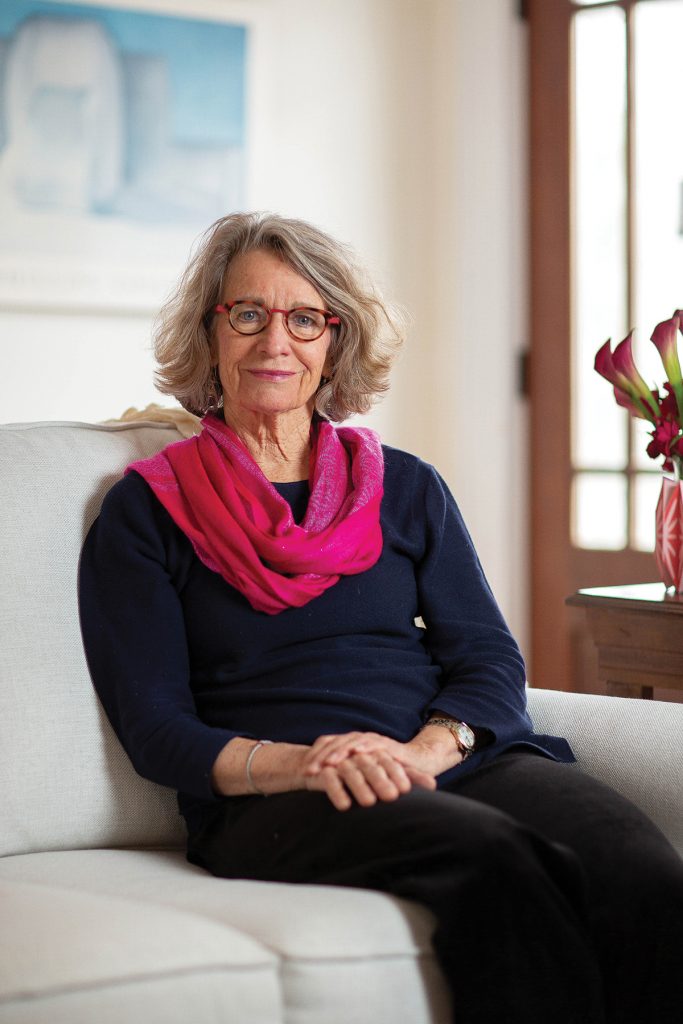By Evie Lindemann
I reached into a tall plastic bin and scooped out a sizable portion of mashed potatoes with an industrial size spoon. In front of me was a rectangular pan laden with the makings of Shepherd’s Pie, chunks of ground beef, carrots, and other chopped vegetables. When I plopped the cloud-like scoops over the top of the pan, I noticed that they resembled football-shaped mounds. My guide in this endeavor was Sean, a combat veteran who had served in the field in Afghanistan. He wore a greying and frayed hat that had the insignia of where he had served. I confirmed this with him through a gentle question about it. His affirmative response gave me a new respect for him; I was struck by his affable and friendly communication and the way he looked me in the eye when he spoke.
I had worked with combat veterans in Connecticut when I was a professor in a graduate program of art therapy, and I was well aware of the cost of war on combat veterans, some of whom rarely spoke, or had fits of fury, or drank coffee all night so they would not fall asleep and have nightmares. Some of them had lost all connection with their families because of the ghost-like presence of their old memories. And standing near me was Sean, able to give me clear instructions with a friendly tone. He even began asking me for help. As it turned out, he was not trained as a chef, but was nonetheless in the position of managing the kitchen and following recipes. He had put too much liquid into the Shepherd’s Pie, and it now resembled soup. He brought over an enormous can of corn starch for me to thicken the mix. We worked together, and in the end, produced three large pans of Shepherd’s Pie, all with mashed potatoes and grated cheese on top. My truth was that I had never made this dish, but I love cooking and working with spices, and it was easy for me to join with him in a project neither of us knew much about.
I ended up volunteering in this kitchen because of a project called the Veterans Restoration Project (VRQ), which houses over a hundred veterans in various stages of transition to a life outside of this structure. These men are seeking permanent housing and employment. Some have experienced trauma. The aim of the program at VRQ is to help veterans get back on their feet, and there are many opportunities to serve other than creating meals for veterans.
One of the men I met in the kitchen, a volunteer from the JCC who prepared the mashed potatoes, had served in Vietnam. In a long conversation with his wife, with whom I sprayed and cleaned dining tables at the site, I discovered they had both survived cancer treatments, and were now here together, donating their time. I counted about eight other JCC volunteers working in the kitchen, each with a different story leading them to volunteer. Our team was organized by Mena Kates, a dedicated woman who sends a monthly reach out to ask for help. When the original organizer was no longer able to continue with the program, Mena agreed to take it on. The larger umbrella organization that funds this effort is a group called ABCCM, a Christian ministry organization. To me, the beauty of the project lays in the intersection of a Christian ministry and the JCC. These connections—the ones that stretch beyond our personal belief systems—create collaborative good will that helps us all.
One of the first things I did when I moved to Asheville, two months before the start of the Pandemic, was become a member of the JCC. The JCC pool and its dedicated staff became my COVID family when I was a newcomer. And now, several years later, an opportunity to contribute to the well-being of the veteran population is being encouraged by the JCC. My wish for all of us is that we identify our talents and see where we can offer them to the larger world.

Image via ashevillemade.com
Kudos to the volunteers from the JCC and Congregation Beth HaTephila for serving our local veterans. Want to volunteer? The Veterans Restoration Project (VRQ) will need more volunteers this winter. To get involved with VRQ or Transition Village, contact Mena Kates mlk8s200@gmail.com.



